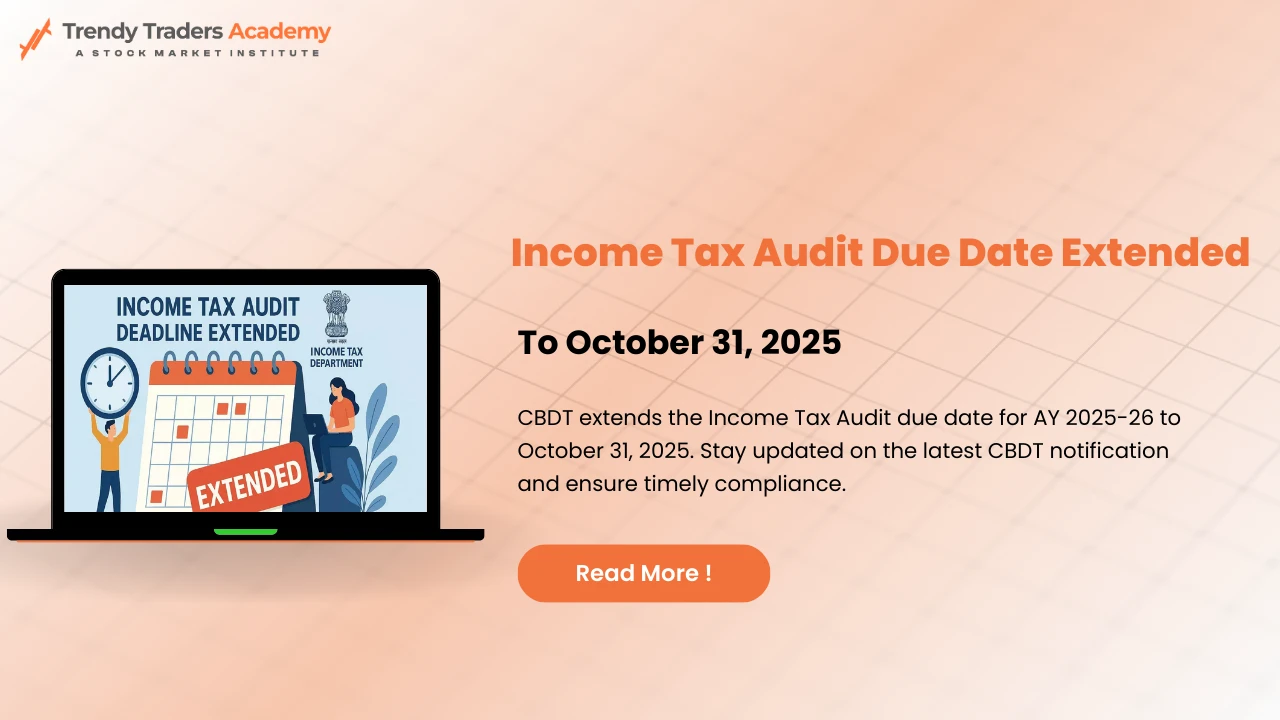Income Tax Audit Due Date Extension 2025: Key Insights on Tax Audit Last Date, CBDT Notification, and Algorithmic Trading Software Price
The approaching income tax audit deadlines pose critical compliance challenges for businesses, professionals, and active traders. As India gears up for the Income Tax Audit Due Date Extension 2025, understanding the tax audit last date rules, following CBDT notification updates, and leveraging technology like algorithmic trading software can make a significant difference in your financial and tax planning.
This comprehensive blog will cover everything about the Income Tax Audit Due Date Extension in 2025, analyze relevant CBDT notifications, explain the tax audit process, and highlight how algorithmic trading software prices are shaping trader decisions in India’s dynamic markets. The article is structured to span over 3,000 words and blend statutory insights with practical trading knowledge.
Stay updated with the latest CBDT notification on Income Tax Audit Due Date Extension 2025, understand the tax audit last date, and explore algorithmic trading software prices for smarter trading.
Introduction to Tax Audit and Its Importance
Tax audits ensure taxpayers maintain accurate records and comply with tax laws. For businesses and professionals crossing specific thresholds, audit reports provide transparency and discourage evasion, reinforcing fiscal discipline.
What is the Tax Audit Last Date?
Generally, the tax audit must be completed and reports filed by September 30 following the fiscal year. For transfer pricing-related audits, it is typically October 31. These deadlines are subject to government notification and possible extensions.
Historical Context of Income Tax Audit Deadlines and Extensions
In the past years, the government has announced extensions considering factors like COVID-19 disruptions and IT infrastructure transitions, helping taxpayers better manage compliance.
CBDT Notification: How and When Are Extensions Announced?
The Central Board of Direct Taxes (CBDT) issues official notifications regarding audit extensions. These are published on the income tax website, in the gazette, and via press releases.
Key Provisions of the Income Tax Act Governing Audit
Section 44AB mandates audit requirements based on turnover or receipt limits. It prescribes forms and timelines, detailing penalties for non-filing or late submission.
Who is Required to File a Tax Audit Report?
Applicability depends on business turnover exceeding ₹1 crore, professional receipts beyond ₹50 lakhs, and specific criteria for presumptive taxation and trading activities.
Understanding Penalties and Consequences of Missing Deadlines
Failure to submit audit reports timely can result in penalties under Section 271B, reduced carry-forward losses, inability to claim certain exemptions, and heightened scrutiny.
Latest Updates on Income Tax Audit Due Date Extension 2025
As of now, official CBDT notification on extensions for the 2025 audit period is awaited. Timely monitoring of CBDT announcements is critical for staying compliant.
Practical Steps After an Extension is Announced
Taxpayers should promptly adjust schedules, complete reconciliations, upload required forms on the e-filing portal, and verify all documents for accuracy.
Preparing for Tax Audit Compliance: Checklist and Best Practices
Maintain meticulous accounts, reconcile broker statements, keep detailed trading records, use digital tools for data collation, and collaborate closely with your auditor.
Role of Technology in Tax Audits: Digital Filing and E-Audit
Advancements include e-filing with digital signatures, AI-driven data validation, seamless audit report uploads, and real-time coordination between taxpayers and auditors.
What is Algorithmic Trading?
Algorithmic trading uses computer programs to automatically execute trades based on predefined strategies and market signals.
Price Range of Popular Algorithmic Trading Software in India
Software pricing varies widely:
- Retail-level software: ₹1,000 to ₹5,000 per month.
- Advanced solutions with AI and customization: ₹10,000 to ₹50,000 annually.
- Institutional-grade platforms priced higher based on features and volume.
Features to Look For When Choosing Algorithmic Trading Software
Look for robust backtesting capabilities, real-time data integration, ease of use, multi-asset support, risk management features, and reliable customer support.
How Algorithmic Trading Software Helps Traders Manage Tax Liabilities
By automating trade execution with set rules, traders can strategically plan transactions for tax efficiency, track performance for audit purposes, and maintain detailed digital records.
Case Studies: Impact of Timely Audit Compliance on Traders and Businesses
Examples reveal how businesses and traders avoided penalties and used compliant audit practices to optimize tax outgo and access benefits timely.
Combining Tax Compliance and Advanced Trading Techniques
Winners in the market blend sharp audit compliance with sophisticated trading—leveraging educational resources, software tools, and expert advisory.
What to Consider When Selecting Tax Consultants and Auditors
Expertise in stock market taxation, technology-savvy processes, proactive communication, and understanding of audit extensions are vital selection criteria.
Future Trends: Digital Transformation and Regulatory Changes
The next years are set for AI-enhanced tax compliance tools, blockchain-based documentation, and evolving regulations on cryptocurrencies and global trades.
Conclusion
The Income Tax Audit Due Date Extension 2025 is a crucial relief mechanism that demands vigilance and swift action. Following the CBDT notification closely and preparing audits with accuracy can save taxpayers from penalties and complications. For traders and investors, complementing compliance with advanced tools like algorithmic trading software and bolstering knowledge through online stock trading courses creates a winning approach for sustained success.
Frequently Asked Questions (FAQs)
Q1: When is the final income tax audit last date for 2025?
A1: Typically September 30, subject to CBDT extension notifications.
Q2: Where can I find CBDT notifications?
A2: Official income tax website and cbic.gov.in.
Q3: What are the penalties for late audit submission?
A3: Penalties under Section 271B, generally up to ₹1.5 lakh or 0.5% of turnover.
Q4: What is the typical algorithmic trading software price in India?
A4: From ₹1,000/month for basic to ₹50,000+ annually for advanced platforms.
Q5: How can online stock trading courses help with tax compliance?
A5: They provide knowledge on tax laws, trade classification, record-keeping, and efficient trading practices.

